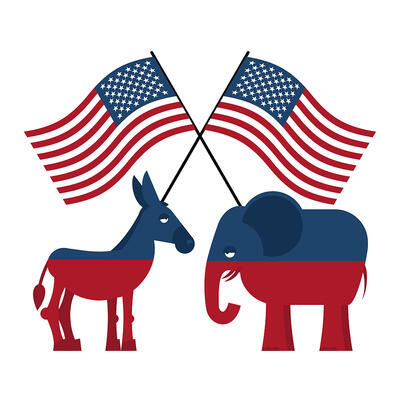Substance Over Loyalty: Why Americans Prefer Members of Their Own Political Party

Americans who identify with a political party care more about policy agreement than party loyalty when evaluating interpersonal relationships, according to a new study funded in part by Yale’s Institution for Social and Policy Studies (ISPS).
In a paper published online last month by The American Journal of Political Science, Gregory Huber, ISPS faculty fellow and chair of the Department of Political Science, and his colleagues show that partisans prefer people who agree with them on the substance of a policy even if that policy deviates from the party’s official or more widely held position. The authors estimate that policy agreement has at least twice as great an effect on people’s evaluations of others than party loyalty.
“There is an enduring debate among political scientists trying to figure out why people like members of their party more than members of the opposing party,” Huber said. “Is it because they prefer people who agree with them on policy issues? Or is it more about sharing a partisan identity? What happens if someone is disloyal to the party?”
In this study, the authors show that a partisan prefers a person they agree with even when they are being disloyal to the party they both identify with.
“For example, an anti-abortion Democrat would be more likely to like an anti-abortion Democrat, even though that person is being disloyal to the Democratic party’s position,” Huber said. “They are both being disloyal, and — for them — it is more important that they agree.”
Huber conducted and co-wrote the study with Lilla Orr, an assistant professor of data science and statistics at the University of Richmond and a former fellow with ISPS and the Center for the Study of American Politics, and Anthony Fowler, a professor in the Harris School of Public Policy at the University of Chicago.
The authors note how difficult it can be to tease apart the sources of affection among co-partisans, demonstrating through experimentation “that information about partisan identity influences beliefs about policy positions, and information about policy positions influences beliefs about identity and other policy positions.” To further disentangle these effects, they recommend “close engagement with theory, creative research designs, and honesty about what we can and cannot learn from different analyses.”
Huber considers the findings optimistic for efforts to reduce partisan animosity, compared with an alternative, lacking convincing evidence, in which partisan disagreement is rooted in an intractable sense of identity.
“If members of one party think of themselves as Americans but the other party is not, we have made political opponents into members of an out-group and othered them in ways that are not easily overcome,” Huber said. “But if the reason we disagree is just because we disagree about issues, I don’t think that should concern us as much. We disagree with people all the time. But based on these findings, at least we can consider us all Americans — that we are all in this together and need to find some commonality.”
He said disagreement can be healthy, so long as we disagree about issues without stigmatizing our opponents or disengaging in the political process.
“I don’t know if we should always agree,” Huber said. “If we always agree, we don’t need politics.”